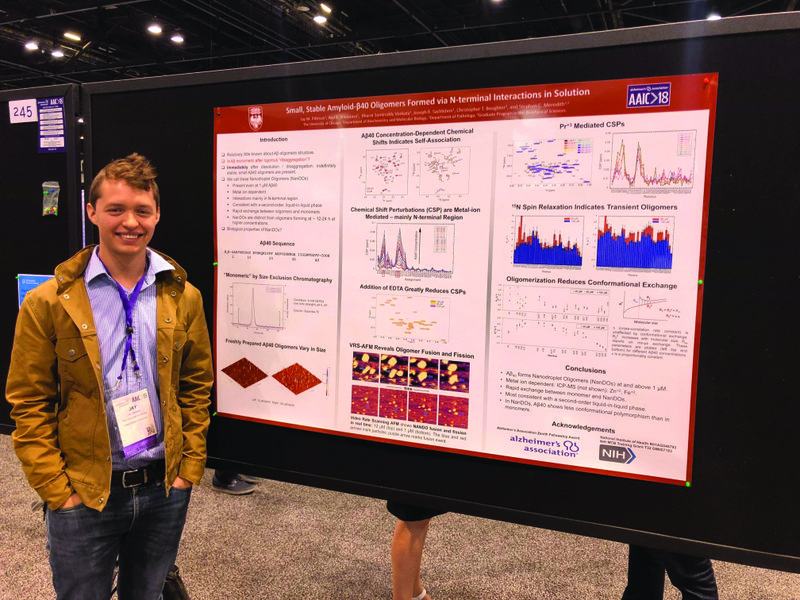Magnolia native Jay Maxson Pittman, son of Mercedes and Jay Pittman, is conducting cutting edge research on Alzheimer’s Disease, one of the most dreaded and debilitating diseases known to humankind. Experts warn of a coming tsunami of the disease since it’s associated with and mostly affects an aging population, though there are cases of early-onset Alzheimer’s. The disease itself is a type of dementia that causes problems with memory, thinking and behavior. It’s the sixth leading cause of death in the country and providing care for patients is becoming prohibitively expensive, making a cure or treatment for the condition that much more important.
Jay grew up in the Village area and attended public school in Magnolia where he graduated with honors from Magnolia High School. After mulling over several offers from various colleges and universities, he finally selected the University of Central Arkansas (UCA) in Conway as the place to begin his journey in higher education. “My half-brother and half-sister had both attended UCA and had a legacy there. I was also particularly attracted to the Schedler Honors College at UCA, which pretty much paid for everything. And during the interview process I was impressed by what I found out about the overall program.”
After he made his choice to attend UCA, Jay decided to pursue a major in biochemistry because he had an interest in obtaining a degree that would help him get into medical school. “I’ll give my dad credit for the major as I had originally picked biology as my field of study, but he suggested biochemistry because it would give me more options for the future, such as working in a lab.”
Just before his graduation from UCA, Jay started to prepare for his future educational endeavors. He began an interview process with several different universities and finally accepted an offer from the University of Chicago (UC) to enter its graduate program. The University of Chicago is a private, non-profit research university located in Chicago, Illinois, and has a long history of scientific research.
After studying at the university for a couple of years, Jay obtained a seat with the PhD program in Biochemistry and Molecular Biophysics. He then went through several assessments to test his knowledge level and his broad area of interest, which was identified as analyzing the cell. Jay was then allowed to rotate into labs and shop around for the specific area that attracted his interest.
Sometime during this period Jay took an Alzheimer’s Disease class that focused on the disease at the molecular level. “Right then I knew that’s what I wanted to do. The brain is a huge black box, and the disease itself is a cascade of things going wrong. We have a hard time finding out exactly what’s causing the damage to the brain. My job is to help identify and understand how these amyloid bodies form at the molecular level. That’s the first step toward finding a treatment for the disease, and there’s a lot of research taking place right now focusing on this area of interest.”
Amyloids form when previously healthy proteins lose their normal characteristics. One form of amyloid particles, amyloid beta, stick together and form senile plaque fibrils that are resistant to normal protein degradation by the body and interfere with the normal functions of cells. At some point these deposits can accumulate enough to form plaques that disrupt the healthy function of tissues and organs. The formation of these plaques in the brain can lead to several different neurodegenerative diseases, including Alzheimer’s.
“The approaches are getting better now as antibody therapy is being used to target amyloid aggregates” Jay explained. “Some research I’ve been personally involved with at the Department of Pathology at The University of Chicago is attempting to determine if metal ions play a role in helping these amyloid bodies form and aggregate.” This type work and other research he’s done on the cell will be the basis for his PhD in Biochemistry and Molecular Biophysics.
Jay has a couple of more years of study left at the university depending on his project selection. He’s looking at places on the East Coast to continue his research in a university-type setting and would also be open to a teaching position. “I want to pursue my avenue of interest in Alzheimer’s research, but it’s all about funding these days,” he explained, “so we’ll see where it goes in the future.”
When asked about his opinion on an eventual treatment or cure for Alzheimer’s, Jay had this to say. “I have a lot of hope as we gather the fundamental knowledge on this disease, especially at the molecular level. There’s still a lot of pieces to this puzzle we need to find to help us put this disease together. But I believe the research we’re doing right now can and will lead to a better understanding and perhaps a treatment for this horrible disease.”
That Magnolia would have one of its own conducting cutting-edge research and taking part in the noble effort to find a treatment or cure for Alzheimer’s disease is a testament to Jay’s parents and the Magnolia School System. Jay developed an interest in science at an early age due to his dad working in a laboratory at a local industry, and he gave credit to Magnolia High School for providing courses and encouragement that bolstered his interest in science and research.

